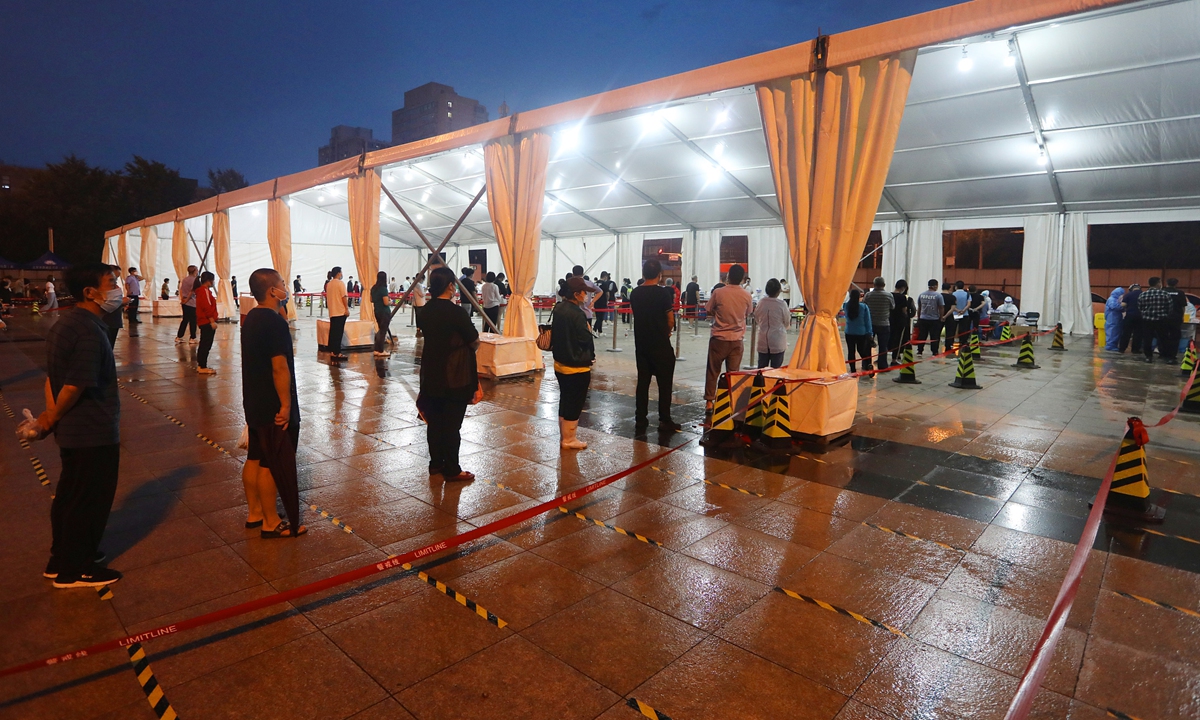Beijing daily COVID-19 testing capability may reach 1 million
By Liu Caiyu Source:Global Times Published: 2020/6/21 22:03:40

Medical workers conduct nucleic acid tests for the coronavirus for employees in the catering industry at the south square of the Beijing Exhibition Center on Thursday afternoon after a heavy downpour. Photo: VCG
Beijing continues to expand its COVID-19 testing capability to meet the mounting demand for nucleic acid tests, and if it adopts batch testing, Beijing could test nearly 1 million people per day
Beijing authorities on Sunday called for the public to be rational in receiving tests. Residents should make an appointment first but those who have no travel history to high-risk regions or contact with people from high-risk regions are not encouraged to do so.
As of Saturday, the number of nucleic acid testing institutions has increased from 98 to 124, and the maximum daily testing capacity expanded from the previous 100,000 to more than 230,000, Beijing authorities said at a press conference on Sunday.
If it adopts batch testing which mixes five samples in a single test, Beijing could test nearly 1 million people per day.
COVID-19 testing hospitals and institutes are working in full swing to meet the huge gap between the daily collected nucleic acid samples and the daily maximum capability for nucleic acid testing, with the number standing at 500,000 and 230,000 respectively.
In a bid to stamp out the spread of novel coronavirus in the city and prompt the normal operations of work and production, Beijing is striving for the goal of "giving nucleic acid tests to people who need them."
To reach the goal, Beijing set up 2,083 sampling points citywide and more than 7,400 staff members from testing institutes are working shifts at full capacity. In the past week, the number of nucleic acid detection samples in the city has increased from 8,000 to nearly 500,000 per day.
The National Health Commission recently dispatched 10 teams of testing staff from Hubei and Liaoning provinces, a total of 212 people, to offer a helping hand to Beijing for nucleic acid tests.
If the staff and devices are fully applied, they could offer 30,000 tests daily for Beijing. They will come to Beijing one after another. On Saturday, medical teams from hospitals in Wuhan reached Beijing.
As of Saturday, the city has sampled a total of 2.29 million people for nucleic acid tests during its screening for COVID-19 cases between June 11 and 20.
An employee from Shougang Hospital affiliated with Peking University told the Global Times on Sunday that the daily testing numbers in their lab ranges from 500 to 5,000 at maximum. Testing staff are working against the clock and many are working overtime during weekends.
Many testing institutes including CapitalBio MedLab said they had been increasing the working staff and testing equipment to cope with increasing amounts of samples. Labs are running 24 hours non-stop.
Despite Beijing opening 124 testing institutes for COVID-19 tests, involving 20 local disease prevention and control departments, 73 hospitals and 31 medical labs, test appointments in hospitals and testing institutes are fully booked about seven days ahead.
The Global Times has called many institutions for COVID-19 testing inquiries on Sunday, many of which couldn't answer or were busy. Most online booking channels were also fully booked at least for the next four days.
The backlog of a large number of samples to be tested led to a delay in issuing nucleic acid test results. Some institutes prolonged the testing results from the previous 24 hours to 48 hours and some even 72 hours later.
Beijing's nucleic acid testing mission will not be over in the next seven to 10 days, thus, to boost the testing capability, Wang Peiyu, a deputy head of Peking University's School of Public Health, told the Global Times on Sunday that testing institutes should further consider increasing working staff and supply of testing kits which will help shorten testing times.
If Beijing adopts batch testing which mixes samples from different people to be analyzed in one test, the testing capability will be largely improved. Some testing institutes in Wuhan used batch testing in its citywide COVID-19 tests. Wuhan has tested nearly 10 million people in 19 days from May 14.
The capital has given priority to large-scale nucleic acid testing among employees in 36 high-risk industries such as catering, supermarkets, shopping malls, trade markets and food deliveries. Many other industries have arranged COVID-19 tests for their employees spontaneously, such as Suning Corp, the Global Times learned.
Nucleic acid tests for a total of 103,000 deliverymen from express companies and food delivery platforms are expected to be completed by Tuesday.
RELATED ARTICLES:
Posted in: SOCIETY